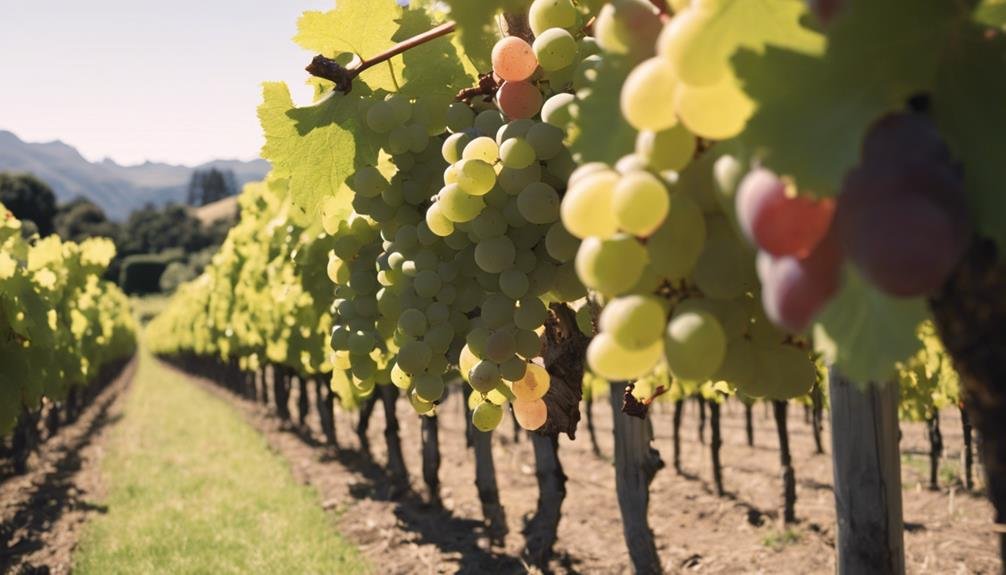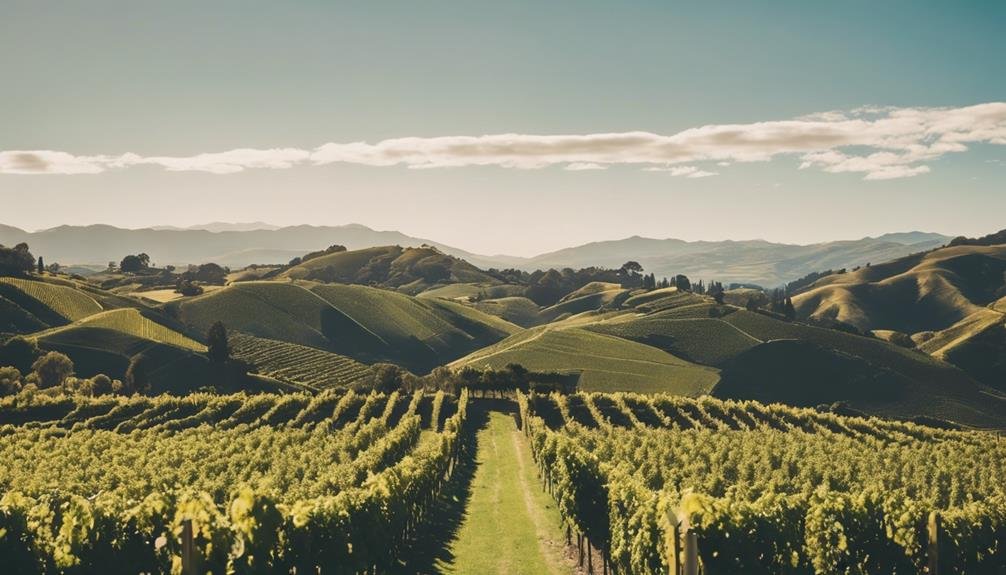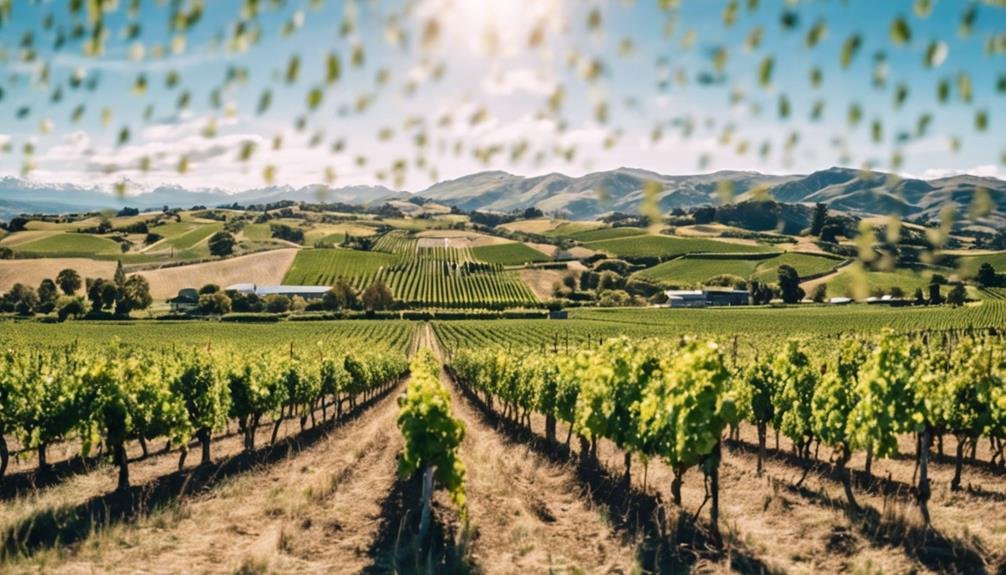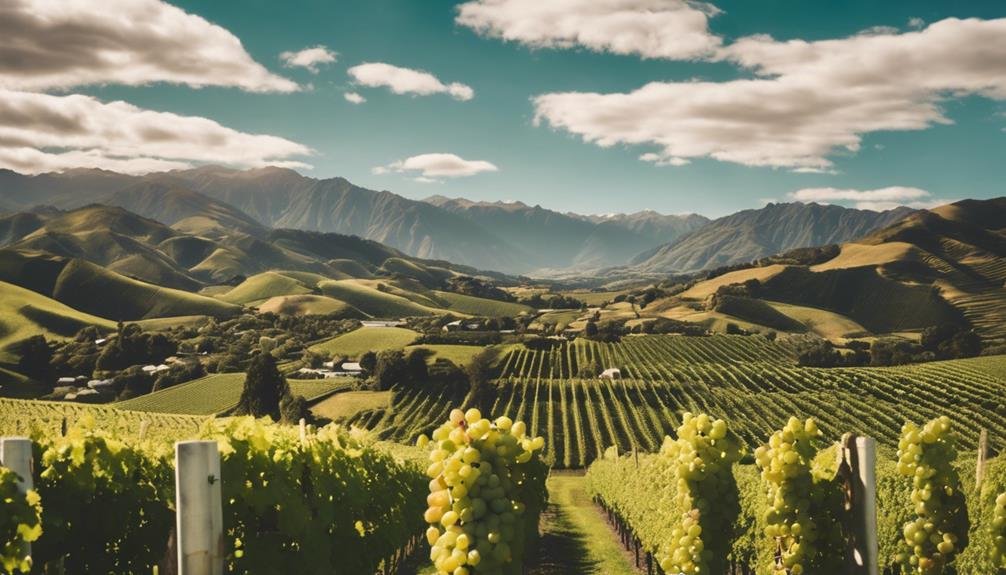New Zealand's vineyards are flourishing with Chardonnay excellence, showcasing diverse regional styles influenced by unique terroir. Winemakers prioritize sustainable practices, ensuring environmental responsibility without compromising quality. Dedication to innovation enhances Chardonnay complexity through oak aging and meticulous vineyard management. This commitment has propelled New Zealand into a prominent global position, crafting balanced and textured Chardonnays that continue to rise in reputation. The lush landscapes offer a backdrop for exceptional wines that reflect the country's unwavering pursuit of excellence and unique flavor profiles.
Regional Diversity of Chardonnay Styles
The regional diversity of Chardonnay styles in New Zealand showcases a spectrum of flavors and characteristics influenced by distinct terroirs and climates across various grape-growing regions. From Northland/Bay of Islands' full-bodied, ripe Chardonnays with tropical fruit notes to Auckland's volcanic soil peach and citrus flavors, each region offers unique expressions.
Gisborne delivers aromatic Chardonnays with stone, citrus, and tropical fruit flavors due to warm climates, while Hawkes Bay presents opulent Chardonnays with peach, nectarine, and grapefruit flavors. Martinborough/Wairarapa provides bright stone-fruit Chardonnays, contrasting with Marlborough and Central Otago's lean, crisp, mineral-driven variations.
These diverse flavor profiles are a result of climate impact, winemaking techniques, and regional expressions, showcasing the versatility and quality of New Zealand's Chardonnay production.
Unique Terroir Influence on Chardonnay
Influenced by diverse soils and microclimates, New Zealand's Chardonnays exhibit a remarkable range of terroir-driven characteristics. The terroir impact on these wines plays a significant role in shaping their unique flavor profiles.
Different regions like Northland/Bay of Islands, Auckland, Gisborne, and others showcase varying terroir influences, resulting in distinct Chardonnay styles. For instance, clay soils contribute to stone-fruit and citrusy characters, while limestone soils in North Canterbury provide elegance and minerality.
The cool nights and long sunlight hours in Central Otago aid in ripening Chardonnay grapes, leading to bright citrus and mineral characters in the wines. Understanding how terroir shapes these Chardonnays allows enthusiasts to appreciate the depth and complexity of New Zealand's winemaking landscape.
Sustainable Winemaking Practices in NZ

Sustainable winemaking practices play a pivotal role in shaping New Zealand's renowned wine industry. The country's winemakers prioritize organic viticulture and biodynamic practices to guarantee environmental responsibility and quality production. With a growing focus on climate change, sustainability initiatives have become integral to vineyard management and winemaking processes.
These include water conservation, energy efficiency, and biodiversity preservation. By implementing such practices, New Zealand's winemakers not only diminish their environmental impact but also aim for long-term viability in the face of changing climates. Embracing sustainable approaches not only safeguards the land but also enhances the overall quality and authenticity of New Zealand's Chardonnays, reflecting a commitment to excellence and environmental stewardship in every bottle produced.
Winemaker Dedication to Chardonnay Excellence
With unwavering commitment and precision, winemakers in New Zealand diligently pursue excellence in crafting Chardonnays that captivate wine enthusiasts worldwide.
- Winemakers in NZ employ a range of innovative winemaking techniques to enhance the quality and complexity of Chardonnays.
- They focus on developing unique flavor profiles, ranging from vibrant citrus and tropical fruit notes to elegant mineral components.
- Emphasis is placed on oak aging methods that contribute to the rich texture and balanced structure of Chardonnays.
- The meticulous selection of vineyard sites and grape clones plays an essential role in shaping the distinct character of each Chardonnay.
- Winemakers' dedication to experimentation and continuous improvement ensures that New Zealand's Chardonnays remain at the forefront of global wine excellence.
Chardonnays Rising Reputation in NZ

Chardonnay's growing reputation in New Zealand is a reflection of the unwavering dedication and innovative techniques employed by winemakers in crafting exceptional expressions of this classic grape variety. The rising popularity of New Zealand Chardonnays is evident as quality evolution takes center stage. Winemakers are focusing on perfecting their craft, resulting in Chardonnays that are garnering attention worldwide.
With a unique perspective on Chardonnay tasting, New Zealand's winemakers are passionate about showcasing the best of what their diverse regions have to offer. From North Canterbury's balanced and textured cool climate Chardonnays to Central Otago's tightly structured and age-worthy varieties, the reputation of New Zealand Chardonnays continues to rise, establishing the country as a key player in the world of Chardonnay production.
Notable Characteristics of NZ Chardonnays
Exhibiting a vibrant array of characteristics, New Zealand Chardonnays captivate wine enthusiasts with their distinct regional expressions and impeccable balance.
- Mineral Driven Profiles: Chardonnays from regions like Marlborough and Central Otago showcase a pronounced mineral-driven profile, reflecting the unique terroir of these cooler climates.
- Tropical Fruit Expressions: From Gisborne to Hawkes Bay, New Zealand Chardonnays offer an abundance of tropical fruit expressions, such as pineapple, mango, and passionfruit, adding a delightful sweetness to the palate.
- Balanced Acidity: Across all regions, these Chardonnays are known for their balanced acidity, which enhances the overall structure and longevity of the wines.
- Elegant Oak Influence: Winemakers skillfully incorporate oak aging, imparting subtle notes of vanilla and toast that complement the fruit-forward profile.
- Complex Layers: With each sip, these Chardonnays reveal intricate layers of flavor, from citrus zest and stone fruit to hints of flinty minerality, creating a multi-dimensional tasting experience.
Future Trends in NZ Chardonnay Production

The evolving landscape of New Zealand's Chardonnay production reveals a shift towards innovative techniques and sustainability practices to meet changing consumer preferences and environmental demands.
Innovation in viticulture is becoming increasingly important as winemakers seek ways to adapt to climate change and produce high-quality Chardonnay sustainably. New Zealand's wine industry is focusing on adopting new technologies and practices to improve vineyard management, enhance grape quality, and reduce environmental impact.
Climate change adaptation strategies are being implemented to mitigate the effects of shifting weather patterns and secure the long-term viability of Chardonnay production. By embracing innovation in viticulture and prioritizing sustainability, New Zealand is poised to continue producing exceptional Chardonnays that reflect the unique terroir of its diverse wine regions.
Frequently Asked Questions
How Do New Zealand Winemakers Balance Oak Influence in Chardonnay Production?
Winemakers in New Zealand carefully balance oak influence in Chardonnay production through precise aging techniques and fermentation methods. By controlling oak exposure, they enhance flavor profiles while preserving fruit purity, creating elegant and age-worthy Chardonnays.
What Makes Chardonnays From North Canterbury Stand Out From Other Regions in New Zealand?
Chardonnays from North Canterbury stand out due to their unique climate impact and refined vineyard techniques. The region's cool climate, limestone soils, and Norwester wind create balanced, textured Chardonnays with bright citrus, mineral characters, and age-worthy potential.
How Do the Unique Limestone Soils in North Canterbury Contribute to Chardonnay Elegance?
Limestone benefits in North Canterbury enhance Chardonnay elegance by imparting minerality and structure. Winemaker techniques amplify these qualities, creating balanced, textured wines. The unique soil composition contributes to the region's reputation for producing high-quality, age-worthy Chardonnays.
What Specific Sustainable Practices Are Employed by New Zealand Winemakers in Chardonnay Production?
Winemakers in New Zealand embrace sustainable practices like organic farming and biodynamic techniques to guarantee environmentally friendly Chardonnay production. They prioritize climate change mitigation and water conservation, reflecting a commitment to quality and innovation.
How Has Winemaker Tony Bishs Dedication to Chardonnay Influenced the Industry in New Zealand?
Tony Bish's steadfast commitment to Chardonnay has greatly impacted New Zealand's wine industry. His innovative approach and passion for the grape have raised the bar for quality, showcasing the country's unique interpretations and solidifying its reputation globally.
Conclusion
To sum up, New Zealand's vineyards showcase a remarkable diversity of Chardonnay styles, each influenced by unique terroirs and sustainable winemaking practices. Winemakers' dedication to excellence has elevated the reputation of NZ Chardonnays, known for their vibrant, mineral-driven, and balanced profiles.
As these wines continue to captivate enthusiasts worldwide, one must wonder: what new innovations and trends will shape the future of Chardonnay production in New Zealand?
